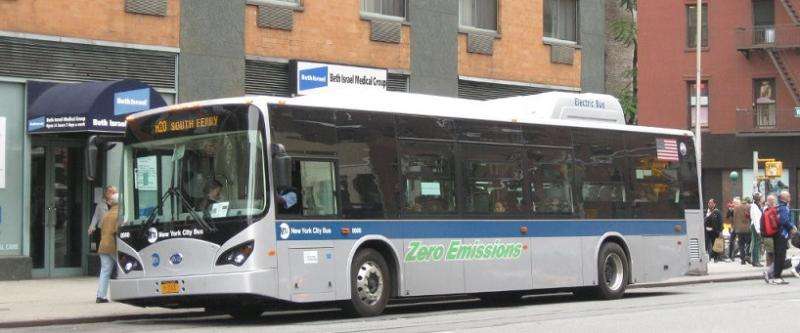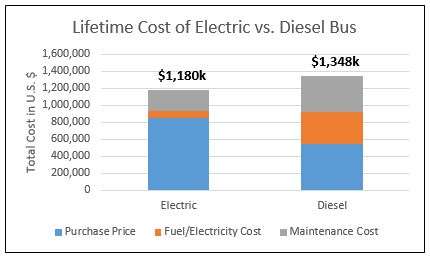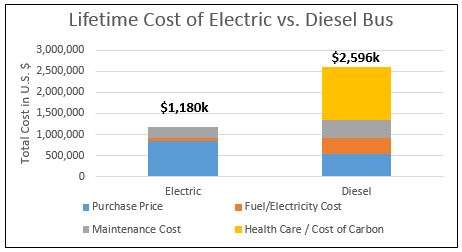Going electric adds up to a good idea for NYC buses

New York City Transit is considering adding electric buses to its fleet. The purchase price of electric buses is higher than for diesel buses-, but using them would reduce harmful emissions. So is this a good idea?
New York City Transit and MTA Bus have a combined fleet of about 5,700 buses, with annual ridership of around 800 million rides per year. The current fleet of buses includes diesel, hybrid diesel, and CNG (compressed natural gas) buses.
As part of OneNYC, Mayor Bill de Blasio has set an aggressive objective to reduce greenhouse gas emissions that contribute to climate change to 80 percent below 2005 levels by 2050. That may seem like a long way off, but cutting greenhouse gases by 80 percent in the face of growing demand and a growing population is a challenging task. The city has a limited number of tools at its disposal, and the primary focus is on reducing emissions associated with buildings. However, the city does not control public transportation and the associated emissions. Those emissions should be addressed as well.
The MTA owns the bus and subway systems in New York City. Public transportation is more efficient than individual car ownership: By riding the buses and subways, New York City residents and visitors are helping to reduce the city's emissions. The MTA has made many investments that have resulted in improved service, resulting in growth in ridership. For example, subway ridership reached a 65-year high in 2014, and that was exceeded in 2015. The MTA has also been making investments in various sustainability projects. The result of the investments and the increased ridership is an overall reduction in greenhouse gases by the MTA and for the city.
Greenhouse gases and electric buses
Changing the entire fleet to all electric buses would result in a net reduction of greenhouse gas emissions within the city limits of over 500,000 metric tons of CO2 equivalent, assuming the current mix of power generation in New York City and Westchester County. That's enough CO2e to make a fractional impact on the country's 2025 GHG commitments made in Paris.

hese results are consistent with those published by the Electric Power Research Institute in conjunction with the NRDC. Variations are possible based on bus manufacturer, bus routes, number of passengers and seasonal impacts to battery life, but the overall and net results will not change appreciably.
What about the cost?
The cost of a diesel bus can range from roughly $450,000 to $750,000 depending on the characteristics of the bus. While the cost differential varies, this analysis assumes that electric buses cost on average $300,000 more. Looking at differences in bus cost and in operating costs over the 12-year life of a bus, the $39,000 annual savings associated with fuel cost (diesel or CNG vs. electricity) and bus maintenance cost more than offsets the higher cost of electric buses. And that does not include potential health care cost benefits.
The up-front additional investment in the electric bus provides a positive NPV (net present value), but there is a long payback period (over 7 years) excluding health care cost benefits.
Health benefits
The use of electric buses would reduce the particulate emissions from diesel-fueled buses and offer an extra benefit in reducing health care costs associated with heart and lung diseases. The savings would come from reduced hospital costs and less time missed at work.

The projected annual cost benefit to New York City from making the switch to electric is approximately $150,000 per bus per year, based on the Environmental Protection Agency's Diesel Emissions Quantifier tool. This translates to roughly $100 per New York City resident of health care savings per year, if the entire fleet is converted to all-electric. With the addition of the health benefits to the analysis, the net present value improves to $1.1M, with a healthy payback of about 2 years.
Experience in other cities
Many other cities around the world have begun exploring the implementation of electric buses. The Antelope Valley Transit Authority in northern Los Angeles is planning to convert its entire fleet of 85 buses to all-electric, the first transit authority in the country to convert completely. Currently, they are seeing a savings of $46,000 per bus per year from operations.
Vienna wants to be a leader in the green movement and has decided to eliminate greenhouse gases in its historic central district as a first step. They have replaced all 12 buses on the inner city route to electric buses.
London has purchased several electric double-decker buses. These buses use slow charging technology, which has been installed in the bus parking facility, where charging takes about four hours and occurs overnight. According to Transport for London, the double-decker buses augment an electric fleet of 22 single-deck buses. So there is quite a bit of experience building in many cities, and it would make sense for New York City to consider its options.
So what's the drawback?

Why hasn't New York City made the switch already? There are several reasons to proceed cautiously. First, the electric bus does have a higher initial purchase price. This impacts the MTA's capital budget, which is distinct from the operating budget. The issue can be worked out, but it's more complex than it seems.
Second, electric buses have not been around for long. Given that the lifetime of a bus is about 12 years, and that batteries can degrade over time with constant charging and discharging, the lifetime performance of electric bus batteries is uncertain. So the city would be prudent to proceed cautiously.
New York City should take the first steps towards purchasing electric buses, and in fact they have. The financial case closes sufficiently, and the health benefits and greenhouse gas reductions are both compelling. The city ran a two-month pilot back in 2013, but they should consider running pilots with at least two vendors for at least a year each to gain a more in-depth understanding of electric bus operations as well as the impacts of seasonality, specifically on battery operation. Investigation of different bus manufacturers should also include learning from the experience of other cities.
The decision to make the transition to electric buses should include input from various constituents, an in-depth understanding of political considerations, and an understanding of sources of financing. Adoption of these recommendations should also include a detailed operational analysis to maintain the high-quality level of service currently provided by the city. By taking these steps, the city will continue to demonstrate transit leadership both in the United States as well as around the globe.
Provided by Earth Institute, Columbia University
This story is republished courtesy of Earth Institute, Columbia University: blogs.ei.columbia.edu/ .


















